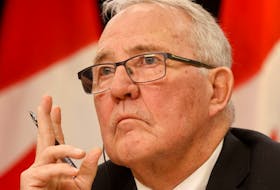
Because that is the only way I feel safe, the only way I can let go and actually listen to what’s going on around me.
I know it — I understand it, to a point. It doesn’t get better. At this point, it’s not going to. It’s one of a bunch of little things I’ve learned to give in to.
But I’m lucky. My demons — from six years or so of accident rescue as a volunteer firefighter — are relatively small and painfully familiar at this point.
The same can’t be said for other emergency services workers.
This week, an RCMP officer in Newfoundland took his own life. Many of us in the Newfoundland and Labrador media have dealt with Cpl. Trevor O’Keefe over the years, and, on the outside, he had always been approachable, likeable and funny. He was always professional.

His obituary starts out, “Passed away on September 11, 2017 after a courageous battle with PTSD…” There are suggestions that he’s the second RCMP officer to have committed suicide in the province this year - a troubling statistic.
[RCMP Cpl. Trevor O’Keefe remembered as outstanding officer, kindhearted man]
I think it’s brave of O’Keefe’s family to talk about post-traumatic stress disorder up front, to make it clear that Cpl. O’Keefe was dealing with a kind of serious issue that many police officers and other first responders are dealing with, many of them in silence, and, unfortunately, with strong feelings of embarrassment.
Some groups suggest that as many as 50 first responders across the country have taken their own lives so far this year and PTSD crops up regularly in that discussion.
Over the years, several people I’ve known in the emergency services have committed suicide. Several others — including some of my heroes when I was a young firefighter — have developed debilitating issues with drugs and alcohol. Many are people who would never let on that they were having trouble, some of them happy-go-lucky jokesters, others who were the epitome of professionalism.
It doesn’t matter. What’s on the outside doesn’t reflect what’s going on inside.
Mental issues are as much an old injury as a crushed disc or a frozen shoulder — like any physical injury, some are more susceptible to harm than others, and there’s no simple formula to say who will be affected, when or why.
One thing I can tell you is that it is exhausting for everyone involved. For spouses, for friends, for everyone. It is a circle that, when you’re feeling fine and least expect it, loops around and comes back at you all over again. And when it does, you are plunged into despair simply because you feel that, no matter how hard you try, you end up right back at the beginning again. You don’t seem to gain any ground, and that is devastating.
What can we do? We can listen, and we can make sure that no one feels that they aren’t allowed to talk or that talking, admitting they are suffering, makes them somehow a failure. We can watch when people start to put up walls, when they suddenly choose to disappear into the background, and try to nudge them towards help.
We can appreciate that it’s not just PTSD sufferers that need support, but their families as well. Because it’s something that’s hard for you to understand in your own head, you need to chew it over and over and over again, the discussion become so repetitive for everyone else as to eventually make even raw despair boring.
We lose some of our most experienced and empathic first responders every year — some because they can’t work any longer, some because they commit suicide. It’s a tremendous waste of skills, experience and lives.
Russell Wangersky’s column appears in 35 SaltWire newspapers and websites in Atlantic Canada. He can be reached at [email protected] — Twitter: @wangersky.









